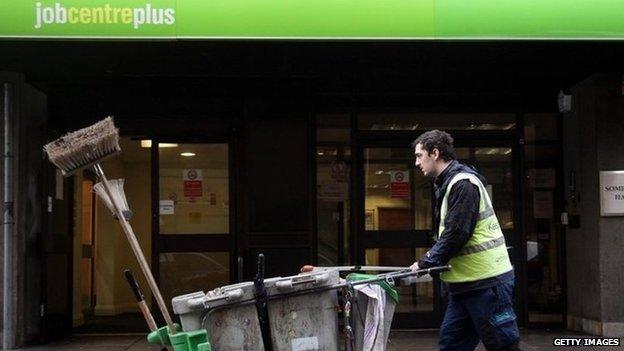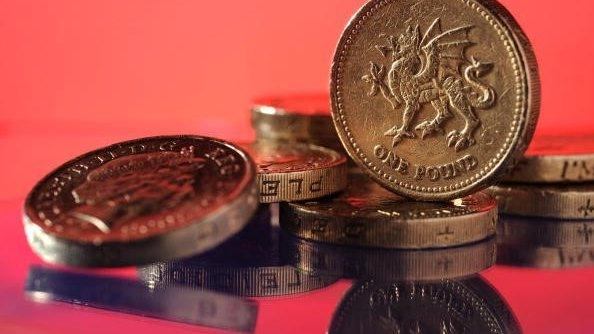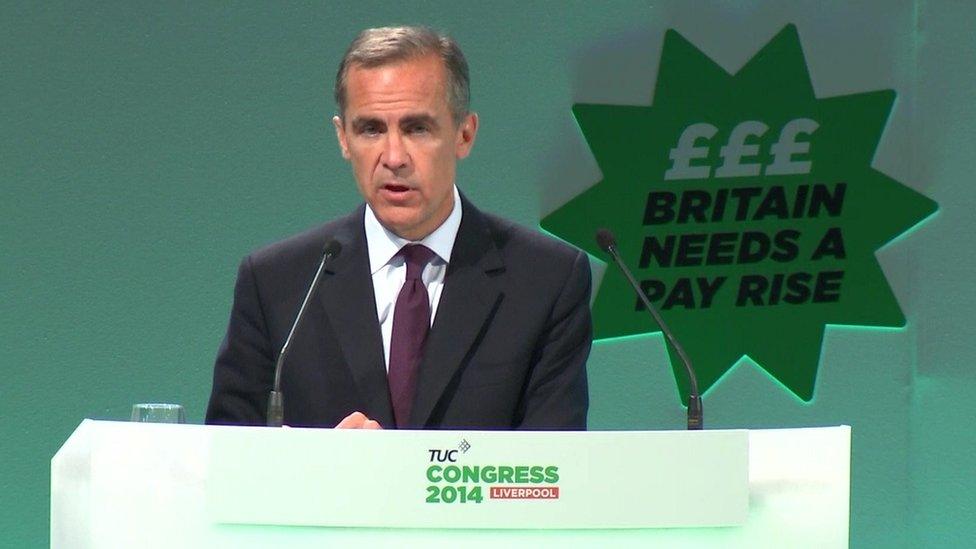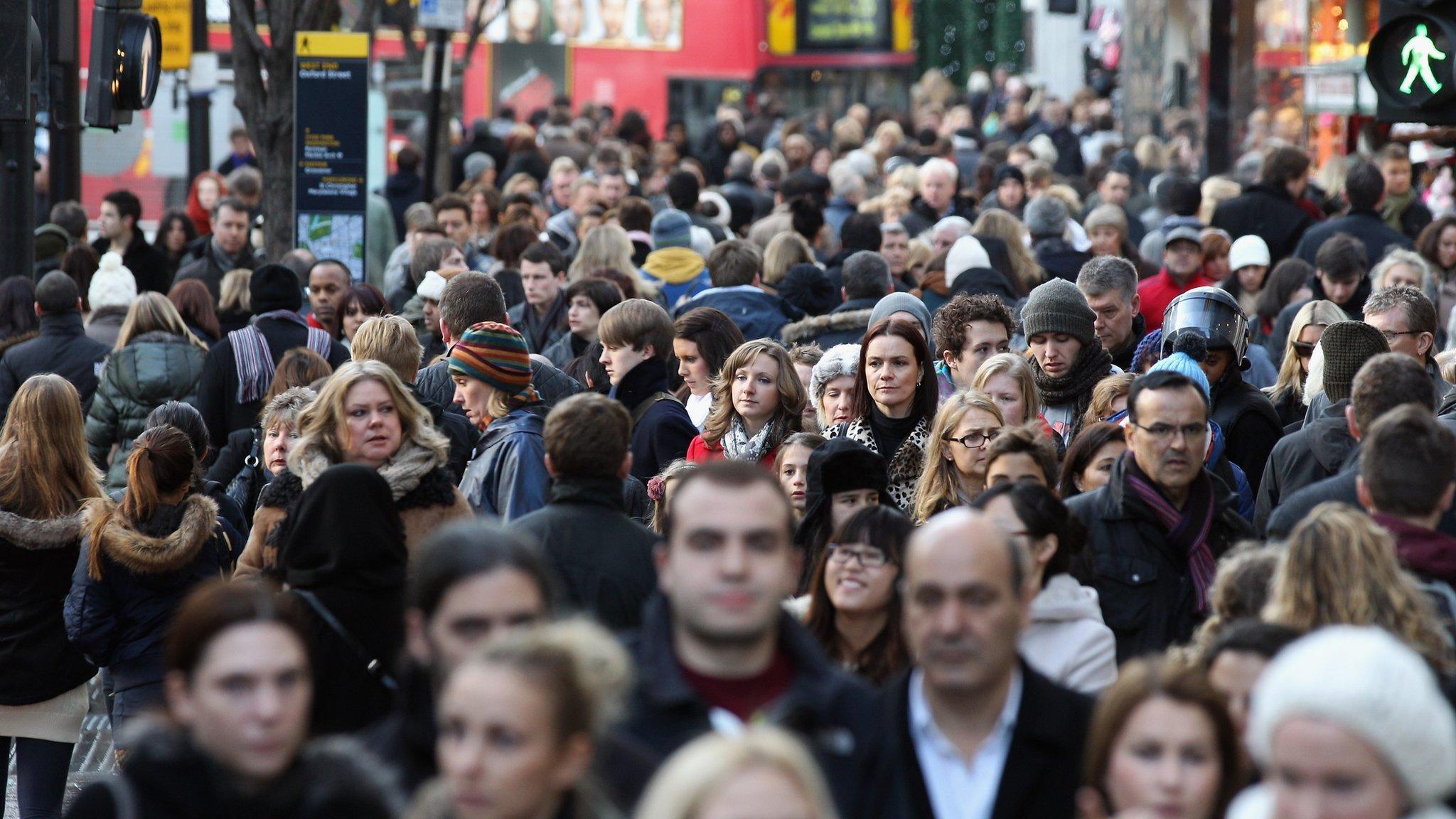Labour minimum wage promise would see £8 per hour rate by 2020
- Published
Ed Miliband: Labour 'determined' to raise minimum wage
The minimum wage would rise to £8 an hour over the course of the next parliament if Labour wins the general election, the party has pledged.
Leader Ed Miliband said it was "not good enough" that one in five people in the UK were on low pay.
But the Conservatives said they had already delivered an above-inflation increase as, from October, the minimum wage will rise from £6.31 to £6.50.
The minimum wage for adult workers was £5.80 at the time of the last election.
Chancellor George Osborne suggested, in an interview with BBC Political Editor Nick Robinson in January,, external that the minimum wage would rise to £7 an hour in 2015 to return the level it was at before the economic downturn.
'Wealth creators'
The rate is recommended by the Low Pay Commission, which is overseen by Liberal Democrat Business Secretary Vince Cable.
Government sources have suggested that the rate would probably rise to £8 by the end of the next Parliament if it continued on current trends. The TUC has called for the minimum wage to increase to £10 an hour.
Mr Miliband announced the policy in interviews with the Sunday Mirror, external and Observer newspapers, external as Labour's annual conference got under way in Manchester.
The party says the £1.50 per hour increase would be worth £60 a week, or £3,000 a year, for the lowest paid.
"Too often people think that politics doesn't care about them," the Labour leader told the Sunday Mirror.
"They are the wealth creators just as much as the top entrepreneurs and the top business people. And we've got to reward them."
Labour's link with the trade unions is "absolutely where it should be" says the shadow business secretary
He said the party would show "how we can become a country that rewards hard work once again".
In the Observer interview he added: "It is not good enough for us that one in five people in our country go out to work, make their contribution and are in low pay."
'Save money'
The proposed increase would affect around 1.4 million jobs. It would be introduced in annual stages by the Low Pay Commission before October 2019.
Mr Miliband's proposed rate is said to be similar to that in force in Australia and EU countries such as Belgium and Germany, but lower than in France and New Zealand.
The Labour leader rejected claims it would cost jobs and be unaffordable for the public sector, such as local councils and hospitals, who are among the biggest employers of low-paid staff.
"It is actually going to save money in benefits," the Labour leader told BBC1's Andrew Marr Show.
"What is happening at the moment is that we are spending billions of pounds subsidising employers who are paying low wages, billions of pounds in benefits, tax credits and housing benefit.
"It is going to have no cost at all to the public sector, and it is the government's own figures that say that."
'Crashing economy'
But business lobby group the CBI said increasing the level of the minimum wage by the amount suggested by Mr Miliband would cost jobs.

CBI deputy director general Katja Hall said: "The minimum wage is set at the highest rate it can be without putting job creation at risk at the moment."
She accused Mr Miliband of trying to "politicize" the Low Pay Commission, adding: "Raising wages in this way would put serious strain on businesses, particularly hard-pressed smaller firms with tight margins, which would end up employing fewer people. Instead, politicians should address how people move on in their careers, through training and better skills, helping them move to higher paying roles over time."
Conservative Culture Secretary Sajid Javid said people would not take "lectures" from Labour on helping people on low pay.
"By crashing the economy, Labour made everyone poorer and they haven't learnt their lesson," he said.
"Ed Miliband would make people worse off with the same failed policies that got us into a mess in the first place - more wasteful spending, more borrowing and higher taxes."
'Dangerous'
The Liberal Democrats said the best way to help the low paid was to cut their taxes.
"Labour has refused to back tax cuts for working people," a spokesperson added.
The national minimum wage is the lowest hourly rate at which workers must legally be paid, although there are lower levels for workers aged 18-20, those under 18 and those working on an apprentice scheme.
It was introduced by Labour in 1997 and the level is reassessed annually by the Low Pay Commission, which then makes a recommendation to ministers.
October's above-inflation increase of 19 pence (3%) - announced in March - will be the first time in six years that the rise is higher than inflation.
The rate for 18 to 20-year-olds will go up by 10p to £5.13 an hour, a 2% increase.
The rate for those aged 16 and 17 will rise by 7p to £3.79, also a 2% rise.
Apprentices will earn an extra 5p an hour, taking their wages to at least £2.73.
In August the Consumer Price Index rate of inflation was 1.5%.
- Published16 January 2014

- Published9 September 2014

- Published13 March 2014
